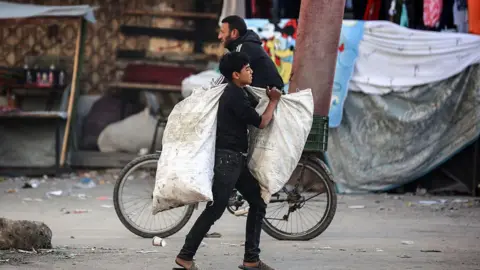In a striking display of dissent within the Jewish community, 36 members of the Board of Deputies of British Jews have publicly condemned the Israeli government for its ongoing military operations in Gaza. Highlighting the gravity of the situation, the signatories characterized the conflict as a “heartbreaking war” with profound ramifications for both Israeli and Palestinian lives. This open letter, which was published in the *Financial Times*, represents the first organized opposition to the Israeli offensive from members of this prominent body, a group that itself consists of over 300 deputies.
The letter’s authors articulated their deep concern about the “renewed loss of life and livelihoods” due to Israel’s military actions, stressing the moral and ethical duty to not remain passive in the face of such suffering. In response, the Board of Deputies acknowledged that approximately ten percent of its membership had signed the letter but suggested that more individuals might sympathize with its content. They stated that the diversity of opinions within the board reflects the complexity of views held by the broader Israeli population, which features a vibrant and often contentious democratic dialogue concerning life-and-death issues.
The open letter’s signatories expressed particular apprehension for what they perceive as the deterioration of Israel’s moral standing, saying that “Israel’s soul is being ripped out.” They criticized the Israeli government’s decision to “break the ceasefire and return to war” instead of pursuing diplomatic avenues for peace. The letter pointed out specific actions, such as Israel blocking humanitarian aid, including food and medicine, which had significant consequences for the civilian population in Gaza. This blockade was enacted following failed negotiations surrounding the release of hostages held by Hamas, signaling the complexities that accompany attempts to establish lasting peace.
The humanitarian impact of the conflict has been devastating, with reports indicating that since the resumption of hostilities, more than 1,650 people have been killed, with an alarming number of those being women and children. Médecins Sans Frontières (MSF), a notable international aid organization, has condemned the situation in Gaza, asserting that the region has effectively transformed into a “mass grave” for its inhabitants. MSF officials noted the ongoing destruction, forced displacements, and overall humanitarian catastrophe resulting from the conflict.
The rhetoric of the letter’s signatories pointed to a broader alignment with the protests within Israel, where many citizens have taken to the streets to demonstrate against the government’s actions. They insist that it is their responsibility, as Jews, to highlight these conflicts and advocate for peace. Among these signatories is Harriet Goldenberg, vice-chair of the international division of the Board of Deputies, who revealed that this action followed the board’s denial of requests to issue a statement opposing the resumption of Israeli military operations in Gaza.
Philip Goldenberg, another signatory and lawyer, noted the prevailing spectrum of opinions within the British Jewish community regarding the ongoing hostilities. He acknowledged that while some may disagree with the resolution to sign the letter, there are many who share similar sentiments but choose to remain silent for personal, pragmatic, or safety reasons.
This expression of dissent came in the context of a broader, ongoing conflict triggered by a cross-border attack by Hamas on October 7, 2023, which resulted in significant casualties on both sides and raised the stakes for future peace negotiations. Since that catastrophic event, over 51,000 people have reportedly died in Gaza due to the active conflict, bringing forth a sense of urgency for both immediate humanitarian aid and long-term solutions to prevent further escalation.
The discourse surrounding this letter reveals not only the internal divisions within the Jewish community in Britain but also the complexities and challenges faced by Israel in its political and military engagements.











